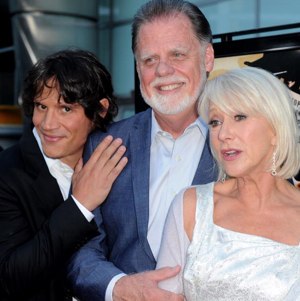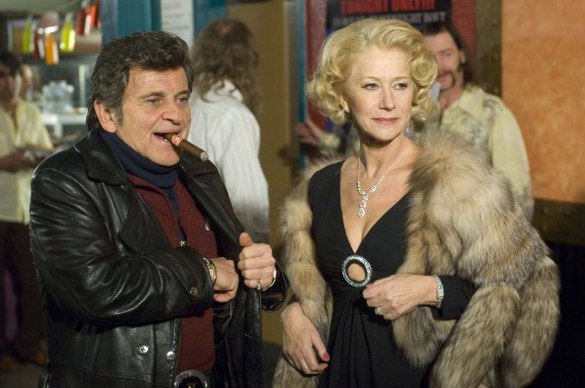Taylor Hackford on Love Ranch -- and Directing Wife Helen Mirren's Sex Scene
You're working with two masters in front of the camera -- one of whom you're pretty intimate with -- and you're hardly a slouch yourself as a filmmaker. I'm interested in that triangulation -- how things function at that level of performance. How did the three of you collaborate?
For me, I just trust them. Number one, I say to my wife, "I want a really good American accent. I want that flat, Western accent. I don't want a Mid-Atlantic accent; this is a working-class woman. I want a flat accent." And she worked at it intensely. With Joe, I had specific things I wanted from him. But at the same time, when you have horse who are thoroughbreds -- that you trust -- once you get them on board, they are themselves. They're professional egos are such that they're going to be serious. They're going to do their research.
For instance: Whorehouses are societies of women. It's not like a pimp with one or two whores. That's a very difficult situation; that's a very exploitative situation. A whorehouse is not exploitative. Those girls are independent contractors. They make their own money, and they can make as much money as they are good at making. But it has to be run, and the person who runs it is a woman. So I took Helen to Nevada and I introduced her to a madam -- a woman who had been at the Mustang Ranch and is now running her own places. I'd met her and thought she was really fantastic. Helen didn't want to go. I said, "Why should you approach this role any differently than anything else you've ever done? When you did _Prime Suspect, did you go to Scotland Yard? Did you meet the female P.I.? Absolutely. You've got to do the same thing here." And when she got there, she loved it. But I let her do her own work once she figured out what it was. She wasn't hanging out with me at the monitor; she was bonding with those actors and developing a relationship that works for the movie.
And then, on the other side, there's Sergio Peris-Mencheta in a kind of breakthrough role.
Yeah, the boxer character is a major character here. He's the catalyst that creates the triangle, and he has to stand toe-to-toe with some consummate veterans. So finding Sergio was a big deal for me. He's fantastic. He gained 35 pounds for the role. He's a physical guy -- he was captain of the Spanish rugby team -- but he'd never boxed. So I put him in Gleason's Gym, here in New York. Jimmy Glenn, who's one of the great legends of the fight game, trained him -- but not the sweet sport of movement. He's not in there looking like Sugar Ray Robinson. [Oscar] Bonavena was a muscle guy. He didn't have style; he just had an incredible punch. For Sergio to learn that -- to mimic that style? If you look at Bonavena and look at this film, Sergio is playing him really authentically.
To put in that person -- who's doing his first film in America and coming into it much younger -- was the interesting quotient to me. You're throwing into the equation new talent who has to be great to stand on the screen with those two. But at the same time, actors never act alone. Him counterbalancing those two veterans was allowing me to say, "I don't know what's going to happen." And those are always interesting moments.
To what extent is it an advantage -- or a disadvantage -- to work with your wife?
Listen. I say this with all sincerity, and you can check the source, but: My wife is the best actress in the world. I believe. There are a couple of others who are pretty damn good. But you're blessed when you work with her. Is there any disadvantage? No... The only sense is that we know each other so well that... Well, even with that, she gave me ultimate respect as a director. I mean, occasionally, when a woman lives with a man for a long time, we all have our eccentricities or sameyness that are in our styles of speech. So therefore they have a way of tuning us out. That's a dangerous situation for an actor and a director. She's already going, "Oh, I've heard his lines before." Well, don't tune me out! A couple of times I found that she'd kind of not listened to what I'd said.
Oh no.
But that was very rare -- very rare. I'd give her a note, and on the next take I'd come back and say, "Hey, here's this note." And I'd say it forcefully. And she'd say, "You don't have to be so forceful! Just tell me!" I said, "I did tell you -- on the last take." So there was that. But very rarely. And on the other hand, the drawback is that the person you're with on a regular basis who you can be candid with, you can also sometimes lose patience with. And she can lose patience with me. She never lost patience with me as a director. I did, occasionally, let my frustration come out in a way that I never would have done with another actor. But I did it with her, because she's my wife, and it was wrong. So there are things you find in that context. When we first worked with each other in '84-'85, we were just discovering each other. It's a different world now.
I don't think there are any real drawbacks, though, to Helen Mirren. She's a leader on the set. She's brilliant. Any actor does this -- like when I was blessed with Jamie Foxx. When you have a vision and you try to get that vision to an actor, if they're great, they'll take your vision far beyond what yours is, and they show you another side. They collaborate with you.
 Very few directors have directed their wives in love scenes and survived to tell the tale. Take David Mamet, Sam Mendes -- real pros, but still. What's the trick?
Very few directors have directed their wives in love scenes and survived to tell the tale. Take David Mamet, Sam Mendes -- real pros, but still. What's the trick?
I've directed a lot of love scenes. I've had a lot of love scenes in my films, but they're acting scenes. They're important for the story. This isn't about showing flesh or anything else. Do you need to know, in An Officer and a Gentleman, that Richard Gere and Debra Winger are having sex before they fall in love? It's about lust. It's about screwing the local girls and then discovering over a certain period of time that you've actually discovered feelings for somebody. The sex is an important key. In Against All Odds, it's instantaneous passion. In Devil's Advocate, it's about being with one wife and dreaming about another. You know? They're scenes that are about character, about story. The fact that they're about a mechanical act is not what it's really about.
So in this instance, I know what I need. At the beginning of this film, Helen was courageous enough to let me make her look tired -- to make it look like she was shut off emotionally and romantically. She's dried up. And over the course of this movie she blossoms. Part of that is hair and makeup and costume, but a lot of it comes from the actress allowing this thing to evolve. You start to see her become younger. You start to see her become more feminine. That's great. But when you come to a moment where you have to see her and Sergio get it on, it's really important that it works. They understand as actors.
To me, it wasn't my wife I had to worry about; Helen will go for whatever. It was Sergio. Think about that: He's acting with an actress who's married to the guy behind the camera. He's got to put his hands on her breasts. He's got to the things that make it real. I was just saying to him, "Listen, this is an acting scene like any other acting scene. If you don't do it correctly, then we're going to be doing it over and over again, and it's going to be ugly. Make it work. Don't worry about me, because I understand what you're doing. And you have to go for it." Otherwise, if you're bringing your own personal life into it, you're going to fail.
Pages: 1 2


Comments
Weird... I just came across your blog by looking for 'financial spreadbetting' on Yahoo. But I don't see any articles on that on here?
I was actually just browsing looking for some Dr. Dre Videos when I found this site...